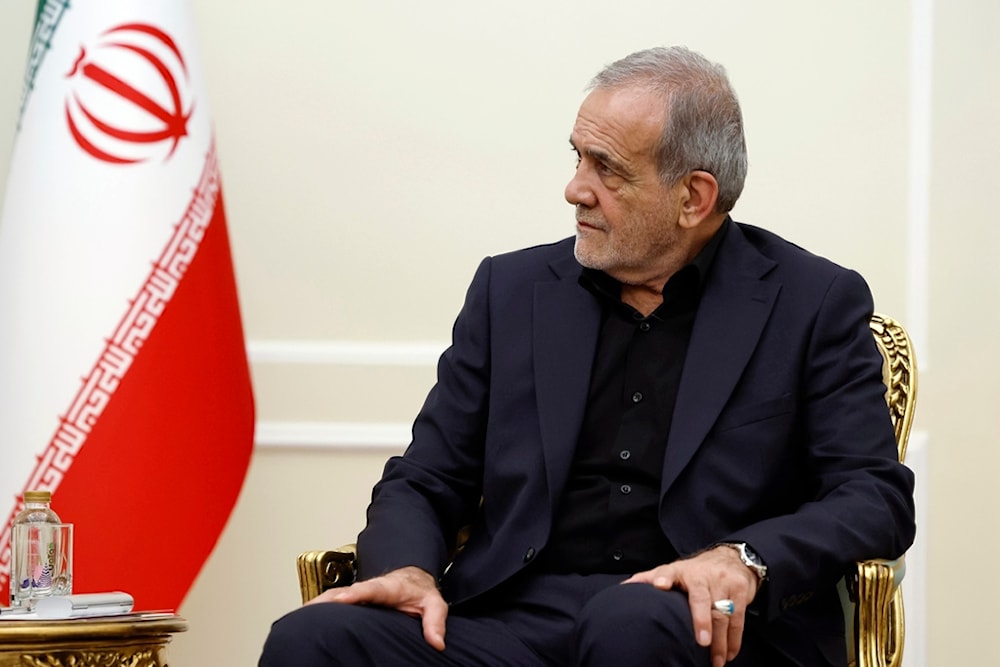Pezeshkian warns 'Israel' against responding to True Promise 2
The Israeli occupation is discussing the possibility and scope of a response to Iran's retaliatory strike.
-

Iranian President Masoud Pezeshkian listens to Russian Prime Minister Mikhail Mishustin during their talks in Tehran, Iran, Monday, September 30, 2024. (AP)
Iranian President Masoud Pezeshkian warned on Wednesday the Israeli occupation against responding to Operation True Promise 2, Iran's retaliatory strike carried out in response to increasing Israeli hostilities and aggression in the region, particularly its assassination of Hamas leader Ismail Haniyeh in Tehran, and Hezbollah Secretary General Sayyed Hassan Nasrallah in Beirut.
Any Israeli response to Iran's Operation True Promise 2 would be met with even greater force from the Islamic Republic, Pezeshkian said. The president's remarks, delivered from Qatar, came in the wake of the Israeli occupation discussing an attack on Iran with the United States.
In a tweet, Iranian President Mahmoud #Pezeshkian said that #OperationTruePromise2 was in accordance with Iran's legitimate rights, and in striving for peace for his country and the region.
— Al Mayadeen English (@MayadeenEnglish) October 1, 2024
Pezeshkian warned Israeli Prime Minister Benjamin Netanyahu that #Iran would stand firm… pic.twitter.com/LW5qXfdMSk
Pezeshkian revealed that Iran was asked to delay its response to the assassination of Hamas political bureau chief Ismail Haniyeh to allow for negotiations regarding a ceasefire. He pointed out that the assassination occurred while Pezeshkian was taking his presidential oath, adding a particularly appalling element to the killing.
The Iranian president emphasized that Iran is not seeking war. "We are not looking for war at all," he said. "We seek peace," but he underscored that regional security is deeply intertwined with the security of Muslims.
He further stated that the Israeli occupation's provocations had forced Iran to react, noting that destabilizing the region's security serves neither European nor US interests.
'Security concerns'
Iran's missile attack against occupied territories on Tuesday night prompted security concerns in "Israel" and among its allies over the consequences of a potential joint operation led by the Axis of Resistance, including Iran and the Islamic Resistance in Lebanon - Hezbollah, a piece published by The Guardian said.
In the article, Peter Beaumont says that while footage circulated showed massive fires at the military bases, particularly Tel Nof Airbase, "Israel" and its allies rushed to coin the attack a failure. However, Beaumont argues that the understanding of the Iranian attack does not solely depend on the damages that were inflicted, but rather on the fact that 181 missiles were able to bypass and pierce the "mighty" Israeli interceptors and air defenses.
According to the author, Iran's operation was able to achieve exactly what it set out to, triggering long-running concerns regarding "Israel's" security and the implications of a possible joint missile attack by the Axis of Resistance.
What is worth noting, however, is the precision that was showcased during the attack, marked by barely any damage to civilian infrastructure, other than minor ones inflicted by shrapnel dropping post-interception.
Although "Israel" boasts its interception and aerial defense capabilities, it also prepped healthcare centers and hospitals to anticipate and expect mass casualty events for when a scenario like Iran's operation plays out.

 4 Min Read
4 Min Read








